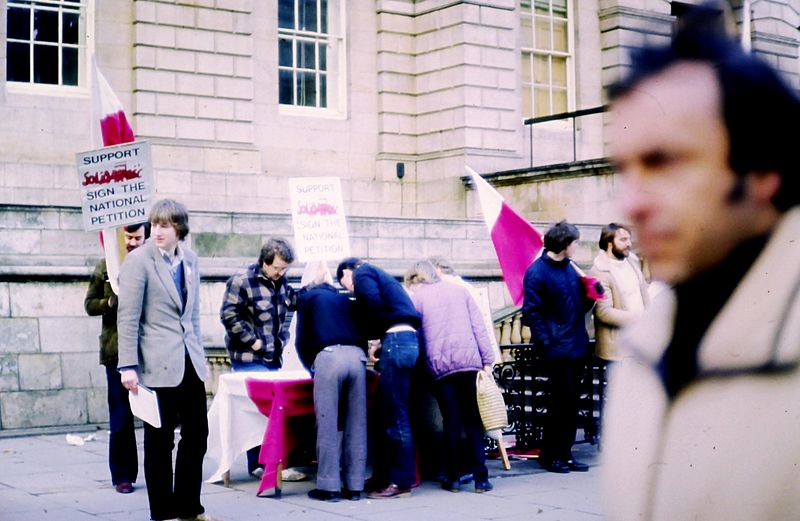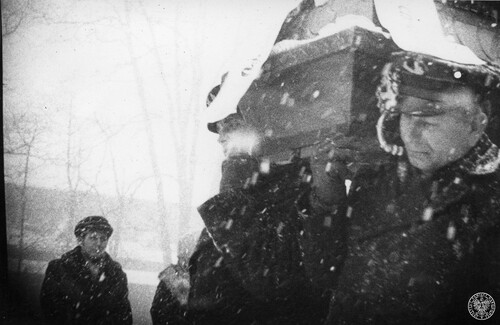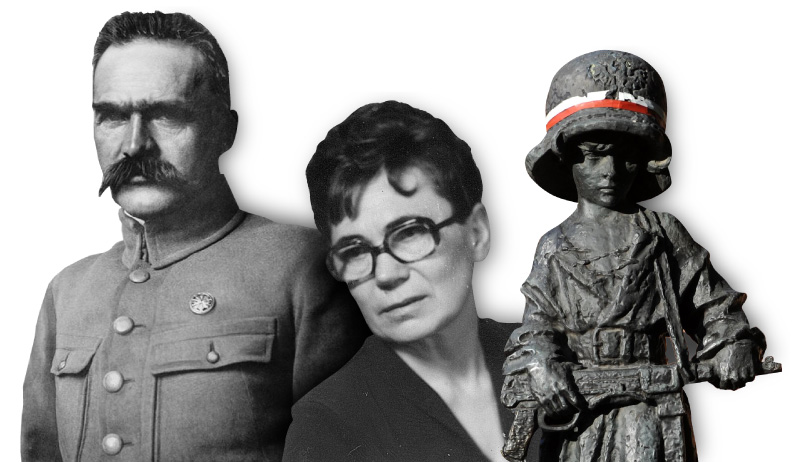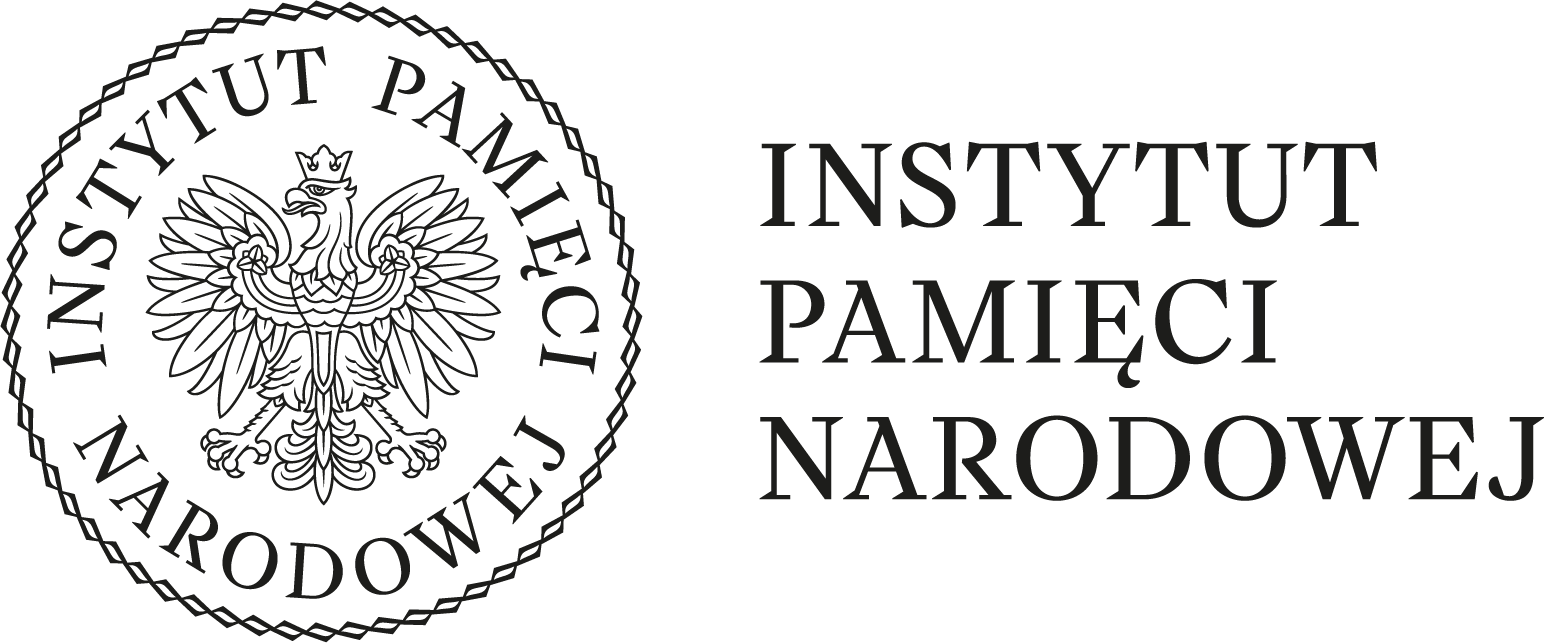During the pacification of the “Wujek” coal mine in Katowice, on December 16, 1981, six miners died from the bullets shot by officers of the special ZOMO [Motorised Reserves of the Citizens’ Militia] unit.
During the pacification of the “Wujek” coal mine in Katowice, on December 16, 1981, six miners died from the bullets shot by officers of the special ZOMO unit. Three more died from bullet wounds. It was the bloodiest episode of the martial law.
They were Józef Czekalski, aged 48; Józef Krzysztof Giza, aged 24; Ryszard Gzik, aged 35; Bogusław Kopczak, aged 28; Zbigniew Wilk, aged 30; and Zenon Zając, aged 22. Three more (Joachim Gnida, aged 28, Andrzej Pełka, aged 19 and Jan Stawisiński, aged 21) died from bullet wounds.
It was the bloodiest episode of the martial law. Officially, the tragic, bloody pacification of the “Wujek” mine was reported on a day later, on the Polish Radio, which informed about the number of mortal victims - seven at the time. (Gnida died on January 2, while Stawisiński on January 25, 1982.)
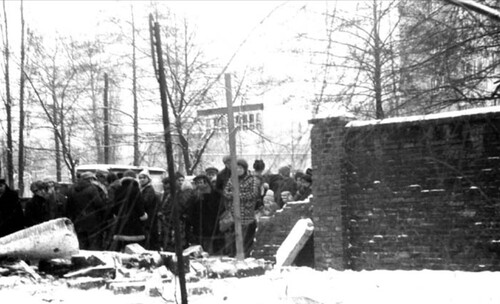
After the massacre. On the following day: the first cross at the “Wujek” mine. Photo: Andrzej Konarzewski (photocopy from: Jarosław Neja, Grudzień 1981 roku w województwie katowickim, Katowice 2011, the Katowice Department of the Institute of National Remebrance - Commission for the Prosecution of Crimes against the Polish Nation)
Uniforms stained with blood
This bloody pacification sparked a lot of comments and reactions across the world. Already on December 17, on the Polish Radio of Radio Free Europe, journalist from this station, Janusz Marchwiński, said:
“The worst happened. Eleven years after the infamous December of 1970, the authorities of the Polish People’s Republic once again pointed rifles at the workers. They did not hesitate to give the deadly order. The information on the killing of seven miners of the “Wujek” mine is shocking.”
His initial comment was not only curt, but also very telling:
“Seven dead, thirty-nine wounded. No one dead on the Citizens’ Militia’s side. The miners were unarmed after all. They could only face the violence with their anger.”
The events in Katowice were commented by Radio Free Europe also in the following days and weeks. And so, i.e. on December 20, Józef Ptaczek said:
“Contrary to official declarations and promises, we’ve had more tragedy and bloodshed in our country. Once again, workers died from the hands of the officers of the security apparatus. Once more, unarmed civilians were shot at. We don’t know the exact number of dead and wounded yet. They were announced by the party’s propaganda institutions, which had been barely trusted by anyone before, and can now be trusted even less.”
Ptaczek pointed to the direct perpetrators, the officers who opened fire on the miners, as the people responsible for this tragedy, as well as to the members of the Military Council of National Salvation [WRON], which we know today was just a facade institution.
“It is them [the members of WRON], who are fully responsible for the tragedy that they themselves orchestrated and performed. Their hands are equally covered in blood like the hands of those who directly performed the criminal policy and are following criminal orders.”
Three days later, Ptaczek, referring to the article from the “Solidarity” weekly from December 4, 1981, stated:
“It perhaps wasn’t an accident that the first mortal victims after the announcement of the occupation of the country by the current military-party junta fell in Silesia. After all, it is in this province where the leader of the party authorities was a well-known dogmatist and opponent of the renewal, the first secretary of the [Polish People’s Republic Province] Committee in Katowice, Andrzej Żabiński, and where the campaign against Solidarity had been conducted for a long time”.
And he recalled that:
“It was at the Katowice province where minor and major provocations and repressions against the Solidarity members took place.”
In turn, another journalist of Radio Free Europe, Tadeusz Podgórski, put the blame on the military, although he put most of the responsibility for the fatal victims on the Citizens’ Militia. He commented:
“At the beginning of their restorative rules, the military junta has stained its uniforms with the blood of unarmed workers. And since the Citizens’ Militia (not only at the <<Wujek>> mine) was assisted by the army - the honour of the army has been stained as well. During times of peace the place of the military is in the barracks, not at the walls of factories and mines. The job of the Citizens’ Militia is to fight crime and keep up public order, not to deal, bloodily, with protesting workers.”
Zygmunt Michałowski, from Radio Free Europe, gave the harshest review of Militia’s actions. Five days after the tragedy at the “Wujek” mine, he said:
“The Citizens’ Militia is killing. They use both firearms and police batons. The ZOMO troops are joining in on the massacre. They are made for dispersing demonstrations and quenching strikes; they are specially trained, prepared and selected for these goals. They are the worst, criminalised social elements who were given a choice to join the special Militia units when they were enlisting into the army, instead of serving in the military which has a different mission after all. These elements, through their earlier criminal, asocial attitude, had already positioned themselves outside the society. These elements are guaranteed special privileges and receive a lot of money for their blind devotion, for the lack of hesitation when they have to shoot at their Polish compatriots.”
“The military regime begins with shooting at workers”
In the face of Poland’s information blockade and the lack of credibility of the authorities of the Polish People’s Republic, as well as media being under their control, the actual number of mortal victims, both at the “Wujek” mine and in the entire country, was highly speculative.
The most prominent British radio and TV broadcaster, BBC, asked Antony Polonsky, expert on Polish affairs and professor at the London School of Economics, for a comment, and he said:
“It is obvious that the miners are the only social category which could put an end to martial law by refusing to extract coal. Without coal, the country cannot operate.”
Polonsky continued his reflections on what could happen next:
“If shots were fired at miners […], then surely there is an atmosphere of outrage in the mines and there is currently a real threat that the miners will refuse to work.”
The BBC also reported on the most interesting articles from the British press about the events in Poland. Almost all newspapers featured this on their front pages:
“Tragic news of miners being shot by Citizens’ Militia at the <<Wujek>> mine in Upper Silesia.”
The Deutschlandfunk broadcaster provided a wider review of comments of the western press:
“Gen. [Wojciech] Jaruzelski’s attempt to impose the authority of the state with force, but without casualties, failed. He overestimated the psychological impact of a militarised operation and underestimated the will of the population to resist. The fact that once again workers in the socialist system fell from bullets, just like in 1970, especially proved the faultiness of this ideology.”
Morning Star, the official newspaper of the British Communist Party also mentioned the events in Katowice. As Radio Free Europe informed, the newspaper wrote:
“The killing of protesting miners in Upper Silesia fills workers across the world with deep sadness and, at the same time, forces them to reflect.”
And commented:
“It is especially tragic that the latest events took place in a socialist country.”
It was also referred to by the outlet of the Italian Communist Party, the L’Unità daily, which also condemned the actions of Jaruzelski’s team. It wrote:
“The authorities of the Polish People’s Republic justified the introduction of the martial law with the fact that it was allegedly the only way to avoid something worse. But here we have violent clashes, we have wounded, dead, blood was shed […]. These tragic events only show that […] a terrible mistake was made.”
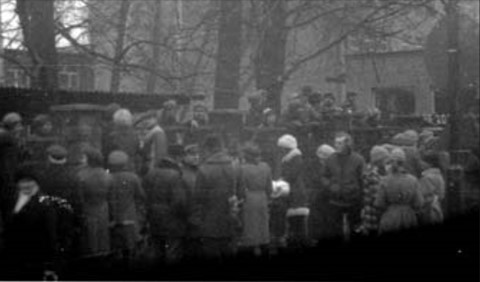
Striking miners of the “Wujek” coal mine talking with their family members and pedestrians, Katowice, December 16, 1981. Photo: Andrzej Konarzewski (photocopy from: Jarosław Neja, Grudzień 1981 roku w województwie katowickim, Katowice 2011, the Katowice Department of the Institute of National Remebrance - Commission for the Prosecution of Crimes against the Polish Nation)
The pacification of the “Wujek” mine was also condemned by the Spanish Communist Party. A fragment of its statement was used in the commentary on the BBC by French political scientist, Jacques Rupnik:
“We know, how the military regime begins - says the statement of the Spanish party. With shooting at workers and putting them on trial. At the same time, no one knows how this will end. Spanish communists give their voice on the matter based on their own experiences, based on 40 years of authoritarian rules of General [Fransisco] Franco.”
Former leader of the Swedish Communist Party, Carl-Henrik Hermansson, spoke in a similar vein in an interview for the Dagens Nyheter daily:
“One should not defend a regime which sends its military to shoot at striking workers. There is no doubt that no friendly relations should be kept with the regime which committed such bloody actions, nor with a party which defends such actions.”
“With vicious intent”
In the face of Poland’s information blockade and the lack of credibility of the authorities of the Polish People’s Republic, as well as media being under their control, the actual number of mortal victims, both at the “Wujek” mine and in the entire country, was highly speculative.
Pope John Paul II, during his homily after the Angelus on December 20, 1981, not only entrusted Poland to the protection of the Mother of God, but also asked for expressions of solidarity with the Polish nation - having the right to live in peace and respect for human rights - and called for a special prayer for the killed, wounded and arrested.
For example, according to the “representative of the Polish Church” who came to Ystad in Sweden, in the clashes between the strikers and the security forces, “about 100 miners died in Silesia”. In turn, “a certain Dutch chauffeur”, after returning from Poland, was to inform a representative of Agence France-Presse (AFP) that he had learned from Solidarity activists that 66 people had died during the clashes between miners and security forces only in the “Wujek” mine. Later, these death toll estimates grew. It has been speculated abroad that in the event of the pacification of “Wujek”, policemen were also killed. And so the New York Times quoted a statement by “a twenty-two-year-old inhabitant of Katowice,” whose father, who was an eyewitness to the attack on the mine, was to later see “the corpses of six people in uniform, covered with white linen.” In turn, “a high-ranking party dignitary” admitted in a private conversation that “at least one policeman died during the suppression of the strike in this mine.”
Over time, there were also reports and comments of foreigners present in the Polish People’s Republic on the subject of the massacre. On December 28, 1981, a German woman studying in Poland was quoted on the air of Radio Free Europe. Four days earlier, she reported by phone that allegedly, during the attack on the mine, “narcotic drugs were used to impact the psyche,” and - which was actually true - “doctors and nurses were also beaten [...] there were wounded among the medical staff.” The author of another, anonymous account was to be an employee of the consulate of one of the socialist countries in Cracow - as it was presumed on the basis of accent and linguistic errors, a Yugoslav or a Slovak - who was said to have “a lot of friends in Poland who asked him to pass a message to the West”. He said, inter alia:
“Many witnesses of the attack on the <<Wujek>> mine claim that the ZOMO units joined the action with incredible fury, <<with vicious intent>>.”
Officers even gave the impression of “people under the influence of drugs”. As he added:
“The task of the army was to surround the area. The military did not have live ammunition. The soldiers told people about it.”
They also supposedly asked for food, “because they had been in action for two days.”
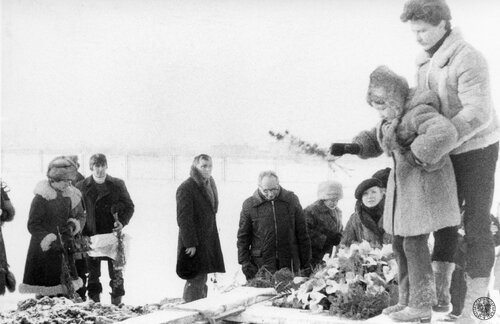
Funeral of Ryszard Gzik, one of the miners murdered by Jaruzelski’s regime during the pacification of the “Wujek” coal mine; A man holds a girl over the grave - Agnieszka Gzik, the daughter of the killed miner, who is laying flowers. December 21, 1981, cemetery in Katowice-Piotrowice, by the Dąbroszczaków Street (currently Armii Krajowej Street). Photo from the archives of the Institute of National Remembrance
“Grave concern”
The authorities of some Western countries also reacted to the “Wujek” massacre. The first - or one of the first - was Sweden. As Radio Free Europe informed on December 18, 1981, the Swedish government published a statement, in which it:
“Expressed shock and indignation at the news that many people were killed and injured by the security forces.”
and
“It strongly condemned this - as it called it - a great crime against human rights.”
Of course, there was also a reaction from the United States. A State Department spokesman stated:
“American government circles observe with concern the use of violence against Poles who are trying to exercise their civil and political rights.”
And he added that:
“There are unconfirmed reports that more than seven people have been killed in clashes between strikers and the security forces in Katowice, as officially reported.”
In addition:
“It again called on the authorities of the Polish People’s Republic to stop attacks on workers, students and intellectuals and to release political prisoners.”
As underlined by the BBC, the State Department questioned the number of deaths given by the authorities of the People's Republic of Poland, referring to:
“More credible sources claim that the death toll may exceed 60.”
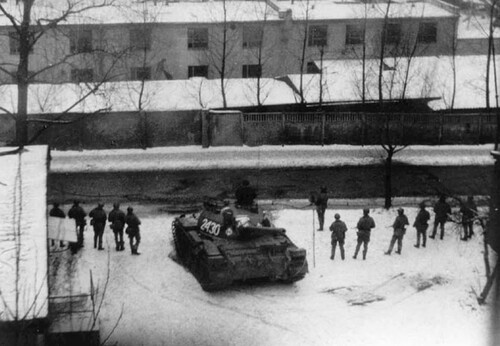
Pacification of the “Wujek” coal mine. One of the tanks prepares a hole in the wall of the mine, Katowice, December 16, 1981. Photo: Leonard Stankiewicz (photocopy from: Jarosław Neja, Grudzień 1981 roku w województwie katowickim, Katowice 2011, the Katowice Department of the Institute of National Remebrance - Commission for the Prosecution of Crimes against the Polish Nation)
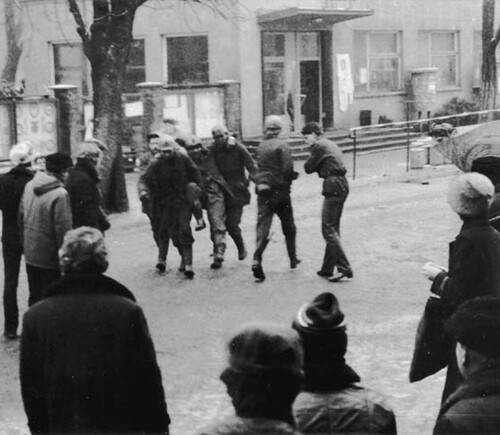
Wounded miners are leaving the area of the “Wujek” coal mine, Katowice, December 16, 1981. Photo: Andrzej Konarzewski (photocopy from: Jarosław Neja, Grudzień 1981 roku w województwie katowickim, Katowice 2011, the Katowice Department of the Institute of National Remebrance - Commission for the Prosecution of Crimes against the Polish Nation)
Later, it was specified that it was allegedly 66 people, of which 10 were to be beaten to death, and the rest were to be killed by bullets. These data were to concern the entirety of Silesia, and the victims - to be the result of "clashes that took place during the breaking of strikes". In this context, Washington's declaration is not surprising:
“The US government believes that the Polish authorities have been excessively brutal and repressive in their actions and therefore wants to organize a united retaliation.”
In turn, the Belgian parliament:
“Honoured with a minute of silence the memory of Poles who died defending freedom.”
While the Minister of Foreign Affairs, Leo Tindemans, called on the authorities in Warsaw to respect the Final Act of the Conference on Security and Cooperation in Europe, signed in Helsinki in 1975.
The head of the Ministry of Foreign Affairs of Ireland, James Dooge, on December 18, 1981, expressed “deep concern” about the events in Poland, and considered the death of miners from “Wujek” a tragedy that could lead the country “to the brink of economic and civil disaster”. This position was also presented by the Irish delegation during the CSCE meeting in Madrid and, on December 23, to the ambassador of the Polish People’s Republic in Hague.
Pierre Mauroy, French prime minister, socialist, also spoke about the miners killed in Katowice and the “continuous workers' protests” in Poland on December 23, 1981, in the French parliament. However, he did not intend to change the “soft” position of Paris adopted on December 13. A similar approach was presented by his communist coalition partner. In early 1982, Georges Marchais, leader of the French Communist Party, stated that the introduction of the martial law entailed:
“Suspension of basic civil liberties, arrests, internment, deaths… all these events shocked us.”
However, this did not affect the position adopted by the French Communist Party that it was:
“Not to take any action that could foster internal confrontation or the internationalisation of the conflict.”
A similar attitude was adopted by the Chancellor of the Federal Republic of Germany, Helmut Schmidt, who, despite the information about the death of miners from “Wujek”, did not intend to change his assessment of martial law as “the lesser evil”.
On the other hand, Pope John Paul II, during his homily after the Angelus on December 20, 1981, not only entrusted Poland to the protection of the Mother of God, but also asked for expressions of solidarity with the Polish nation - having the right to live in peace and respect for human rights - and called for a special prayer for the killed, wounded and arrested.
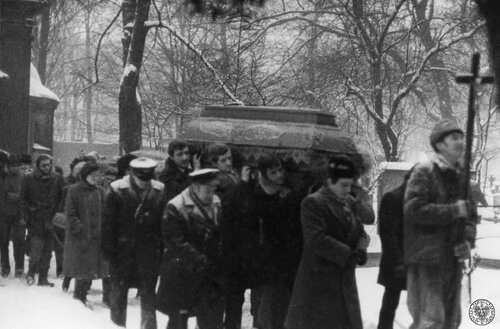
Funeral of Bogusław Kopczak, one of the miners murdered by Jaruzelski’s regime during the pacification of the “Wujek” coal mine; December 19, 1981. The funeral procession marches through an alley at the Katowice cemetery, by the Francuska Street. The person in front of the coffin is most likely Fr. Walerian Ogierman. Photo from the archives of the Institute of National Remembrance
The bells ring on the other side of the ocean
It was not only the authorities of individual countries and the media that reacted. It was also done by people and organisations, especially those from the Polish diasporas. It is impossible not to mention the mysterious group called “The Organisation of the Defence of Poles on December 13”, which was to operate in Denmark and Norway. Its activity was limited to sending a leaflet to Polish diplomats in Copenhagen and threats against their colleagues in Oslo. The group threatened - as reported by the Ministry of Foreign Affairs, which monitored the reactions of Western countries to the introduction of martial law - with the killing of “one Polish People’s Republic’s diplomat for each death of a worker in Poland”. With the current state of research, it is impossible to say whether this organisation was an ephemera, or whether it was the work of a single person or a small group. However, the connection of its actions with the bloody pacification of "Uncle" does not seem to be accidental - the phone with threats to the embassy of the People's Republic of Poland in Copenhagen was made on December 20, three days after Polish Radio informed about the events in Katowice.
Usually, however, the reactions were calmer and limited to manifestations, religious services and political statements. This was the case, for example, in Chicago, where the Polish American Congress on December 27, 1981 organized a funeral march in honor of the murdered miners. About 50 thousand people took part in it, including representatives of the Association of Polish Combatants in the United States. On the same day, at the call of the Association, Holy Masses were held in Polish parishes and services for the victims of the martial law, and at 2 p.m. the bells of churches rang for five minutes. In addition, at the end of December 1981, at the Chicago cemetery in the veterans’ quarters, the inscription “Solidarity” was placed, which was to symbolize “miners and workers murdered by the security services after the declaration of martial law”. At the beginning of 1982, the Polish Army Veterans Association in America and the Association of Polish Combatants announced a joint resolution in the Kombatant w Ameryce magazine, accusing Jaruzelski of introducing a terror in Poland that had not existed since the Stalinist era. It stated, inter alia:
“Our brothers in Poland are murdered and imprisoned for demanding bread and freedom.”
And they appealed to the soldiers of the Polish People's Army not to shoot their “Polish brothers”. The cover of Kombatant w Ameryce directly alluded to the tragedy in the “Wujek” mine, with a photo of miners carrying the body of a dead colleague.
Article from issue no. 12/2017 of the Bulletin of the Institute of National Remembrance
